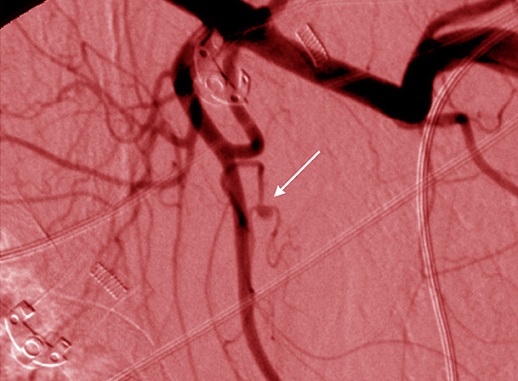Doctors warn that COVID-19 can cause spontaneous arterial bleeding during helmet CPAP treatment
Nikhil Prasad Fact checked by:Thailand Medical News Team Nov 29, 2024 4 months, 1 week, 6 days, 23 hours, 36 minutes ago
Medical News: Researchers from the University of Messina and the University of Cagliari in Italy conducted a critical investigation into an unusual complication encountered in patients with severe COVID-19. They reported spontaneous
arterial bleeding in the lateral thoracic and subscapular regions in three patients treated with helmet continuous positive airway pressure (H-CPAP). This
Medical News report delves into their findings and the implications for critical care practices during the pandemic.
 COVID-19 can cause spontaneous arterial bleeding during helmet CPAP treatment
Large left pectoral hematoma due to spontaneous bleeding - digital subtraction angiography (DSA) frame. The DSA shows a 3 mm pseudoaneurysm (white arrow) arising from a small branch of the subscapular artery. The pseudoaneurysm represents one of the most common signs of vascular damage and requires embolization.
Understanding the Problem
COVID-19 can cause spontaneous arterial bleeding during helmet CPAP treatment
Large left pectoral hematoma due to spontaneous bleeding - digital subtraction angiography (DSA) frame. The DSA shows a 3 mm pseudoaneurysm (white arrow) arising from a small branch of the subscapular artery. The pseudoaneurysm represents one of the most common signs of vascular damage and requires embolization.
Understanding the Problem
COVID-19, caused by the SARS-CoV-2 virus, predominantly affects the respiratory system, often leading to severe pneumonia, acute respiratory distress syndrome (ARDS), and hypoxemic respiratory failure. Non-invasive ventilation methods like H-CPAP have been widely adopted for managing such cases. The helmet interface, which covers the entire head, is believed to provide better tolerance for prolonged therapy compared to traditional masks.
However, the study revealed a rare complication: spontaneous arterial bleeding in patients undergoing H-CPAP. The bleeding episodes were linked to the compression caused by the straps securing the helmet, raising concerns about the safety and complications of such treatments.
Case Presentations
Three cases were highlighted, each presenting unique insights into this complication. The patients were hospitalized at the University Hospital “Gaetano Martino” of Messina during 2021-2022 for severe COVID-19 and required intensive respiratory support.
Case One:
Patient Details: An 82-year-old woman with a history of hypertension, ischemic heart disease, diabetes, and emphysema.
Condition: Developed spontaneous bleeding in the thoracic and subscapular regions 72 hours after starting H-CPAP therapy.
Treatment: Underwent successful embolization of the bleeding artery but later succumbed to septic shock after 39 days in the ICU.
Case Two:
Patient Details: A 78-year-old man with chronic obstructive pulmonary disease and hypercholesterolemia.
Condition: Experienced hemorrhagic shock due to bleeding from the right thoracic region after two days of H-CPAP.
Treatment: Successfully treated with embolization and discharged after 34 days of hospitalization.
;
Case Three:
Patient Details: A 79-year-old man with hypertension, diabetes, and prostate cancer.
Condition: Diagnosed with bleeding from the subscapular artery within 48 hours of initiating H-CPAP.
Treatment: Emergency embolization was performed, but the patient passed away due to ARDS complications.
What Makes These Cases Unique?
This case studies sheds light on a novel observation - while H-CPAP is a cornerstone of non-invasive ventilation strategies, the pressure exerted by its securing straps can lead to vascular complications. The researchers hypothesized that the compression might disrupt blood flow, causing vessel damage and subsequent bleeding. Therapeutic anticoagulation, which is standard for severe COVID-19 cases, may exacerbate this risk.
Imaging studies from these cases revealed large hematomas and active bleeding, which required immediate intervention. The use of embolization procedures to control the bleeding was successful in two cases but highlighted the delicate balance needed in managing COVID-19 patients.
Broader Implications of the Findings
This study emphasizes the need for critical evaluation of the equipment used in respiratory therapy. While H-CPAP provides significant benefits in managing respiratory distress, the associated risks - particularly in anticoagulated patients - must be carefully monitored. Adjustments to helmet design or securing mechanisms could reduce complications and improve patient outcomes.
The findings also underscore the complexity of managing severe COVID-19 cases. Balancing anticoagulation to prevent thrombosis while mitigating bleeding risks requires a nuanced approach. Careful assessment of each patient’s condition, regular monitoring, and swift intervention in case of complications are essential.
Conclusions and Recommendations
The study concludes that spontaneous arterial bleeding in COVID-19 patients undergoing H-CPAP therapy, though rare, is a serious complication that healthcare providers must be aware of. The researchers recommend:
-Reevaluating the design of H-CPAP helmets to minimize pressure on sensitive areas.
-Enhancing monitoring protocols for patients on H-CPAP, particularly those receiving anticoagulation therapy.
-Training ICU staff to recognize early signs of vascular complications and respond promptly.
While H-CPAP remains a vital tool in managing respiratory failure, its application must be tailored to individual patient needs, considering potential risks. The study’s findings highlight the importance of a patient-centric approach in critical care, ensuring that innovative therapies do not inadvertently harm the patients they aim to save.
The study findings were published in the peer-reviewed journal: Frontiers in Medicine.
https://www.frontiersin.org/journals/medicine/articles/10.3389/fmed.2024.1418029/full
For the latest COVID-19 News, keep on logging to Thailand
Medical News.
Read Also:
https://www.thailandmedical.news/news/covid-19-can-cause-cervical-arterial-dissections-or-tears-in-the-wall-of-the-large-blood-vessel-in-the-neck
https://www.thailandmedical.news/news/breaking-covid-19-news-case-study-shows-that-even-asymptomatic-sars-cov-2-infections-can-lead-to-spontaneous-bowel-perforations
https://www.thailandmedical.news/news/doctors-warn-that-covid-19-can-cause-spontaneous-esophageal-rupture
https://www.thailandmedical.news/news/breaking-pediatricians-warn-that-covid-19-can-cause-gastric-perforations-in-new-borns
